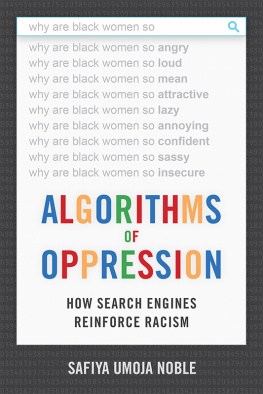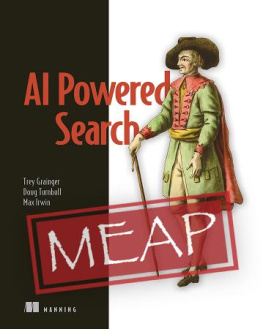ALGORITHMS OF OPPRESSION
Algorithms of Oppression
How Search Engines Reinforce Racism
Safiya Umoja Noble

NEW YORK UNIVERSITY PRESS
New York
NEW YORK UNIVERSITY PRESS
New York
www.nyupress.org
2018 by New York University
All rights reserved
References to Internet websites (URLs) were accurate at the time of writing. Neither the author nor New York University Press is responsible for URLs that may have expired or changed since the manuscript was prepared.
ISBN: 978-1-4798-3364-1 (e-book)
Library of Congress Cataloging-in-Publication Data
Names: Noble, Safiya Umoja, author.
Title: Algorithms of oppression : how search engines reinforce racism / Safiya Umoja Noble.
Description: New York : New York University Press, [2018] | Includes bibliographical references and index.
Identifiers: LCCN 2017014187| ISBN 9781479849949 (cl : alk. paper) | ISBN 9781479837243 (pb : alk. paper)
Subjects: LCSH : Search enginesSociological aspects. | Discrimination. | Google.
Classification: LCC ZA 4230 . N 63 2018 | DDC 025.04252dc23
LC record available at https://lccn.loc.gov/2017014187
For Nico and Jylian
CONTENTS
I want to acknowledge the support of the many people and organizations that made this research possible. First, my husband and life partner, Otis Noble III, is truly my most ardent and loving advocate and has borne the brunt of what it took for me to write this book and go around the country sharing it prior to its publication. I am eternally grateful for his support. For many years, he knew that I wanted to leave corporate America to pursue a Ph.D. and fulfill a lifelong dream of becoming a professor. When I met Otis, this was only a concept and something so far-fetched, so ridiculously impossible, that he set a course to make it happen despite my inability to believe it could come true. I am sure that this is the essence of love: the ability to see the best in others, to see the most profound, exceptional version of them when they cannot see it for themselves. This is what he did for me through the writing of this book, and somehow, given all the stress it has put us under, he has continued to love me each day as Ive worked on this goal. I am equally indebted to my son, who gives me unwavering, unconditional love and incredible joy, despite my flaws as a parent and the time Ive directed away from playing or going to the pool to write this book. I am also grateful to have watched my bonus-daughter grow into her own lovely womanhood through the many years Ive spent becoming a scholar. I hope that you realize all of your dreams too.
My life, and the ability to pursue work as a scholar, is influenced by the experiences of moving to the Midwest and living and loving in a blended family, with all its joys and complexities. This research would not be nearly as meaningful, or even possible, without the women and girls, as well as the men, who have become my family through marriage. The Nobles have become the epicenter of my family life, and I appreciate our good times together. My many families, biological, by marriage, and by choice, have left their fingerprints on me for the better. My sister has become a great support to me that I deeply treasure; and my favorite brother, who will likely have the most to say about this research, keeps me sharp because we so rarely see eye to eye on politics, and we love each other anyway. I appreciate you both, and your families, for being happy for me even when you dont understand me. I am also grateful to George Green and Otis Noble, Jr., for being kind and loving. You were, and are, good fathers to me.
My chosen sisters, Tranine, Tamara, Veda, Louise, Nadine, Imani, Lori, Tiy, Molly, and Ryan, continually build me up and are intellectual and political sounding boards. I also could not have completed this book without support from my closest friends scattered across the United States, many of whom may not want to be named, but you know who you are, including Louise, Bill and Lauren Godfrey, Gia, Amy, Jenny, Christy, Tamsin, and Sandra. These lifelong friends (and some of their parents and children) from high school, college, corporate America, and graduate school, are incredibly special to me, and I hope they know how deeply appreciated they are, despite the quality time I have diverted away from them and their families to write this book.
The passion in this research was ignited in a research group led by Dr. Lisa Nakamura at Illinois, without whose valuable conversations I could not have taken this work to fruition. My most trustworthy sister-scholars, Sarah T. Roberts and Miriam Sweeney, kept a critical eye on this research and pushed me, consoled me, made me laugh, and inspired me when the reality of how Black women and girls were represented in commercial search would deplete me. Sarah, in particular, has been a powerful intellectual ally through this process, and I am grateful for our many research collaborations over the years and all those to come. Our writing partnerships are in service of addressing the many affordances and consequences of digital technologies and are one of the most energizing and enjoyable parts of this career as a scholar.
There are several colleagues who have been helpful right up to the final stages of this work. They were subjected to countless hours of reading my work, critiquing it, and sharing articles, books, websites, and resources with me. The best thinking and ideas in this work stem from tapping into the collective intelligence that is fostered by surrounding oneself with brilliant minds and subject-matter experts. I am in awe of the number of people it takes to support the writing of a book, and these are the many people and organizations that had a hand in providing key support while I completed this research. Undoubtedly, some may not be explicitly named, but I hope they know their encouragement has contributed to this book.
I am grateful to my editors, Ilene Kalish and Caelyn Cobb at New York University Press, for bringing this book to fruition. I want to thank the editors at Bitch magazine for giving me my first public-press start, and I appreciate the many journalists who have acknowledged the value of my work for the public, including USA Today and the Chronicle of Higher Education.
Professors Sharon Tettegah, Rayvon Fouch, Lisa Nakamura, and Leigh Estabrook were instrumental in green-lighting this research in one form or another, at various stages of its development. Important guidance and support along the way came from my early adviser, Caroline Haythornthwaite, and from the former dean of the Information School at Illinois, John Unsworth.
Dr. Linda C. Smith at the University of Illinois at Urbana-Champaign continues to be an ardent supporter, and her quiet but mighty championing of critical information scholars has transformed the field and supported me and my family in ways I will never be able to fully repay. This research would not have happened without her leadership, compassion, humor, and incredible intelligence, for which I am so thankful. I suffer in trying to find ways to repay her because what may have been small gestures on her part were enormous to me. She is an incredible human being. I want to thank her for launching me into my career and for believing my work is a valuable and original contribution, despite the obstacles I faced or moments I felt unsupported by those whose validation I thought I needed. Her stamp of approval is something I hold in very high regard, and I appreciate her so very much.
Dr. Sharon Tettegah taught me how to be a scholar, and I would not have had the career Ive had so far without her mentorship. I respect her national leadership in making African American womens contributions to STEM fields a priority and her relentless commitment to doing good work that makes a difference. She has made a tremendous difference in my life.











